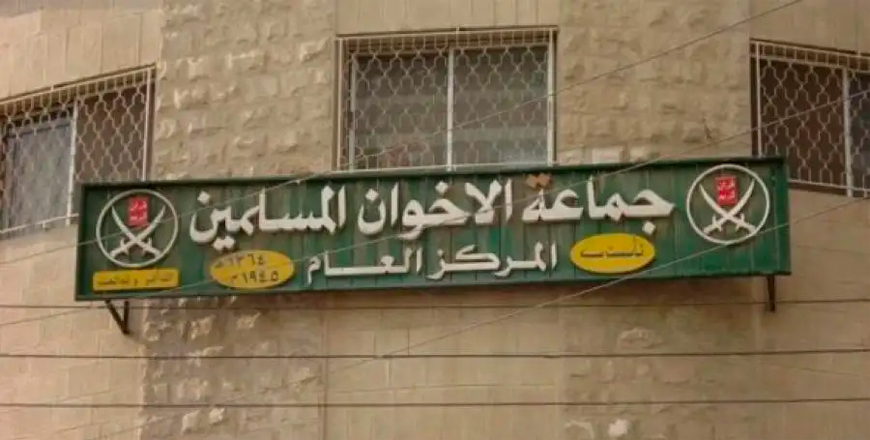You are here
Amid security threats, Jordan needs to prioritises stability over political tolerance – analysts
By Rana Husseini - Apr 24,2025 - Last updated at Apr 24,2025

Headquarters of the Muslim Brotherhood group in downtown Amman (JT file)
AMMAN — Political experts on Thursday stressed the importance of safeguarding Jordan’s stability and sovereignty above all political activities, following the government’s decision to ban the Muslim Brotherhood group.
"Realising the balance of power and acting accordingly is not a betrayal of faith—it is its very essence," said Academic Advisor to the Politics Society Instate Mohammad Abu Rumman.
Abu Rumman, former minister of culture, pointed out to the “serious violations of national unity that occurred during the protests that was carried out by Muslim Brotherhood members”.
“Such violations included verbal attacks on the Jordanian army and state. Though these were isolated incidents and not treated harshly, they contributed to a broader and escalating mood that now requires national reflection and recalibration,” Abu Rumman told The Jordan Times.
On Wednesday, Interior Minister Mazen Faraya announced the immediate enforcement of the law provisions on the so-called dissolved Muslim Brotherhood by considering it an illegal association.
“We decided to close all headquarters or premises that are used by the Muslim Brotherhood or sites that are shared with other entities, under penalty of legal accountability,” the minister said.
Al Rai Columnist Bilal Hassan Tal added that the Muslim Brotherhood members do not learn from their previous mistakes.
“The problem with the Muslim Brotherhood is that [they] always believe they are right and if anyone opposes their beliefs and ideologies then this person is an apostate,” Al Tal said.
At the same time, Al Tal added, the Muslim Brotherhood worked over the years to “imbed certain ideologies within its members that is far from what Islam teaches us,” Al Tal told The Jordan Times.
The minister also announced during a press conference the banning of all activities related to the so-called Muslim Brotherhood and considered it an illegal association.
Faraya called on the committee that is entrusted with seizing all assets related to the Muslim Brotherhood to expedite the process in accordance with the law.
The minister also stressed that membership in the so-called dissolved Muslim Brotherhood is prohibited, as well as the spreading of its ideologies.
He added that legal action will be taken against any individual or entity if the current investigations into the terror-related cases that were announced last week prove that there are connections with the suspects or the alleged plots.
Researcher Ibrahim Ghraibeh explained that the problem with the Muslim Brotherhood is that “it was penetrated by Hamas”.
“There is a secret group within the Muslim Brotherhood that is affiliated with Hamas and the Brotherhood does not know about them,” Ghraibeh explained.
This was one issue, Ghraibeh explained.
The other issue, Ghraibeh added, was that after October 7 of last year, the Muslim Brotherhood, which was banned in Jordan for some years, “started working underground and instigating the public with many activities, including some that were critical of the Jordanian security forces”.
On April 15, the General Intelligence Department (GID) announced that 16 men, including some who were members of the Muslim Brotherhood, allegedly planned to cause chaos and sabotage acts in Jordan.
The group was charged with terrorism and manufacturing explosive substances against the suspects involved in alleged plots targeting Jordan’s national security.
The GID had said that the 16 men were arrested following close intelligence monitoring since 2021.
Their alleged plans included manufacturing short-range rockets using local tools as well as tools imported for illegal purposes, possession of explosives and firearms, concealing a rocket ready to be deployed, planning to manufacture drones and recruiting and training operatives in Jordan as well as training them abroad, the GID said.
The minister revealed new information related to the case of the 16 suspects and their alleged illicit operations, including that one of its members allegedly manufactured explosives and made an experiment to make sure that it was good for use.
He added: “They were targeting sensitive premises and security forces”.
The interior minister said during the press briefing that on the day the authorities announced the arrest of the 16 individuals, Muslim Brotherhood members destroyed a large number of documents in an attempt to hide their suspicious activities and connections.
Some of the suspects appeared on national television where they reportedly confessed to their affiliation with the Muslim Brotherhood and their alleged roles in manufacturing missiles, drones and recruiting others to join them.
According to the indictment sheet, the SSC’s prosecutor charged three defendants with manufacturing weapons (missiles) with illicit intent and committing acts that disturb public order and endanger the safety and security of society.
In a separate case involving the drone manufacturing project, four defendants were charged with carrying out acts that disturbed public order and acts that endanger the safety and security of society.
In two recruitment cases, the prosecutor charged five defendants with committing acts that disturb public order and acts that endanger the safety and security of society.
Meanwhile, four suspects are currently being tried at the SSC in connection with the alleged transport and storage of explosives and automatic weapons smuggled from abroad, including the concealment of a missile in an Amman suburb, according to the SSC prosecution office.
During a press conference last week, Government Communications Minister and official spokesperson Mohammad Momani told reporters that the 16 suspects were allegedly involved in four “coordinated plots” that the GID has foiled after years of surveillance and investigation.
The alleged plots, according to Momani, were aimed at threatening national security, using short-range missiles, explosives, drones and automatic weapons.
The minister added that the suspects allegedly recruited operatives from abroad for militant activities.
"These cases were serious and deliberate attempts to harm Jordan's national security," Momani said.
"Under no circumstances will Jordan tolerate any attempt to undermine its national security," Momani stressed.
















